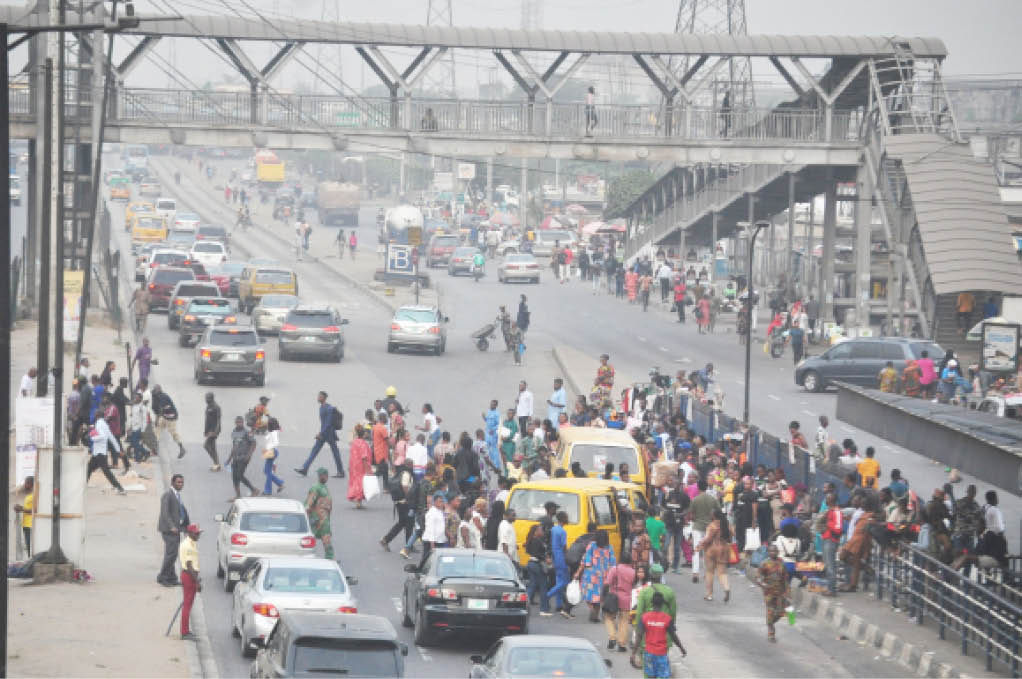As you probably know, Lagos State calls itself the Centre of Excellence. It is unclear to whom that piece of flattery is owed.
Perhaps it was intended as an ambition. But it is deployed as a fact or a badge of honour. On the government’s website, Governor Babajide Sanwo-Olu’s welcome message says: “The Centre of Excellence has a duty to lead. Our government has taken the bold (sic) steps to always ensure that Lagos State maintains that leadership position…”
It pronounces six themes, perhaps as guardrails to, or towards, excellence. They include: Traffic Management & Transportation; Health & Environment; and Security & Governance.
The problem is that despite being Nigeria’s richest economy by a large margin, Lagos scores embarrassingly badly on most of those self-chosen themes. Last week, it emerged—again—as one of the four most unlivable cities on earth in a survey of 174 cities by the Economist Intelligence Unit.
The only cities worse than Lagos: Damascus, Syria; Tripoli, Libya; and Algiers, Algeria: each of them with such problems as conflict and terrorism. Lagos has no such issues. Yet.
The picture is no better should you zoom out the lens of history. In 2022, in a ranking of 172 cities, only one was worse than Lagos. Ten years earlier, in 2012 and during the governorship of Babatunde Fashola, only one city was worse. And 10 years before that, in 2002 and during the governorship of Bola Ahmed Tinubu, Lagos tied for 127th out of 130 cities.
In other words, Lagos is more of a centre of embarrassment than of anything else. It is not a functional city. It is not a modern city, and apparently does not aspire to be. It has been bad, and unchanging, for a very long time despite vast government revenues and large supplies of official bravado.
But here is what is worse: it is most probably the world’s most unlivable city, if you consider that it has been awful for as long as EIU has provided this survey and that the couple of cities that Lagos has sometimes been alleged to be better than were because of specific and serious social issues. It is frightening to think that if such cities as Damascus and Tripoli were not grappling with their current problems, Lagos would be stuck at the bottom of the EIU list year after year.
While Lagos brags about a mythical “excellence” that others have achieved, it has gone through as many as 15 governors without anyone uplifting it into a modern state and city.
Like much of Nigeria, Lagos has been held back by lack of ambition or vision. Take the first theme on that list, for instance: traffic management and transportation. While the city of Lagos now has better roads than it did 30 or even 20 years ago, they are not better managed, and driving in the city is worse.
Why? To begin with, the traffic patterns in 2023 are the same as they were when Fela sang his famous “Ojuelegba” song about 50 years ago. On almost every road, any driver or truck-pusher can drive in any direction at any time. No government has productively reviewed or changed the use of any to enable traffic flow to improve. Very often, in some cases, traffic from different ends of the same road simply blocks off the other, and a new chaos erupts. That is not how a modern city functions.
Regarding driving, there isn’t much evidence that most of the people who drive in Lagos earned their licences. Driving is a combat sport and there appears to be no consequence for the most egregious behaviour. That is a jungle, not a livable city.
Think about parking. The state government gives licences to anyone who wants to build commercial facilities, with no provision for parking. Even big businesses such as banks and hotels are not compelled to build adequate parking facilities, the assumption being that roadside parking would suffice. As Fela would have testified, that has been false for eons.
On Lagos weeknights, as state officials besiege various parties enjoying power (no pun) and—I presume—“excellence,” Lagos streets and bridges packed with rush-hour traffic often resemble a jungle, with street lights eerily turned off. There is no sense of a government in control. And there is no relief for motorists who, trapped in dense traffic for hours, desire toilet facilities. That has never been the concern of Lagos governments…but that is not how a modern, livable city functions.
Next, and perhaps the foundation of the chaos of what is perhaps the world’s worst city, no government in Lagos State has actively committed to the urgency of a comprehensive modern drainage and sewage system.
Yes, Lagos does build roads, even if they are mostly shortsighted and limited dual carriageways, but not even Akinwunmi Ambode, who, in one term of office demonstrated an appetite for futuristic infrastructure thinking, took up this challenge. And Lagos will never be a modern, livable city without it.
What is considered to be drainage in Lagos is often built by individual property owners: perhaps a two-feet deep hole in front of the property over which the road into the property runs. That superficial construction—which is often much higher than the road itself, is otherwise often uncovered, thereby becoming a receptacle.
On every Lagos city street, that trash soon begins to rot, stinking up the choicest estates and neighborhoods, and leading to flooding. Where it may have been nicely covered, the property owner then has to have it broken up again so that it can be cleaned up, sometimes with that debris emptied into the road.
Anyone who has been to Lagos, or who is in Lagos today, has experienced these images. Why? Because unlike roads, a realistic modern drainage or sewage system cannot be executed on a home-by-home basis. This is what government after government has refused to undertake in Lagos and it is one reason why some of the most beautiful estates in the city are compromised even before they are built.
What does this mean? Among others: that you often can find no safe sidewalk on which to walk or jog. And people do consider that to be critical when they think of a livable city. For instance, the five-star Marriott Hotel in the state capital, Ikeja, has rooms that are almost $1400 per night, but none of its guests can confidently walk its Joel Ogunnaike Street pavement because of the smelly exposed drainage. Consider also, the commercial Allen Avenue where, in the 40 years since it was developed, the state government has failed to set it up so that people can park or shop. Shamelessly, it has a “broken drainage” system.
This means that Governor Sanwo-Olu needs only one theme: “Lagos that works.” For it to be competitive as a livable city, the government must substitute grandiloquence for actual work, towards making it clean and safe and prosperous.
That, dear Governor, would make realistic your vision of: “Making Lagos Africa’s Model Mega City And Global Economic and Financial Hub.” You have four years to do it.
Otherwise, Lagos holds the potential only to be the City of Excess, not Excellence. Permanently.
This column welcomes rebuttals from interested government officials.
• [email protected]
• @Sonala.Olumhense


 Join Daily Trust WhatsApp Community For Quick Access To News and Happenings Around You.
Join Daily Trust WhatsApp Community For Quick Access To News and Happenings Around You.


